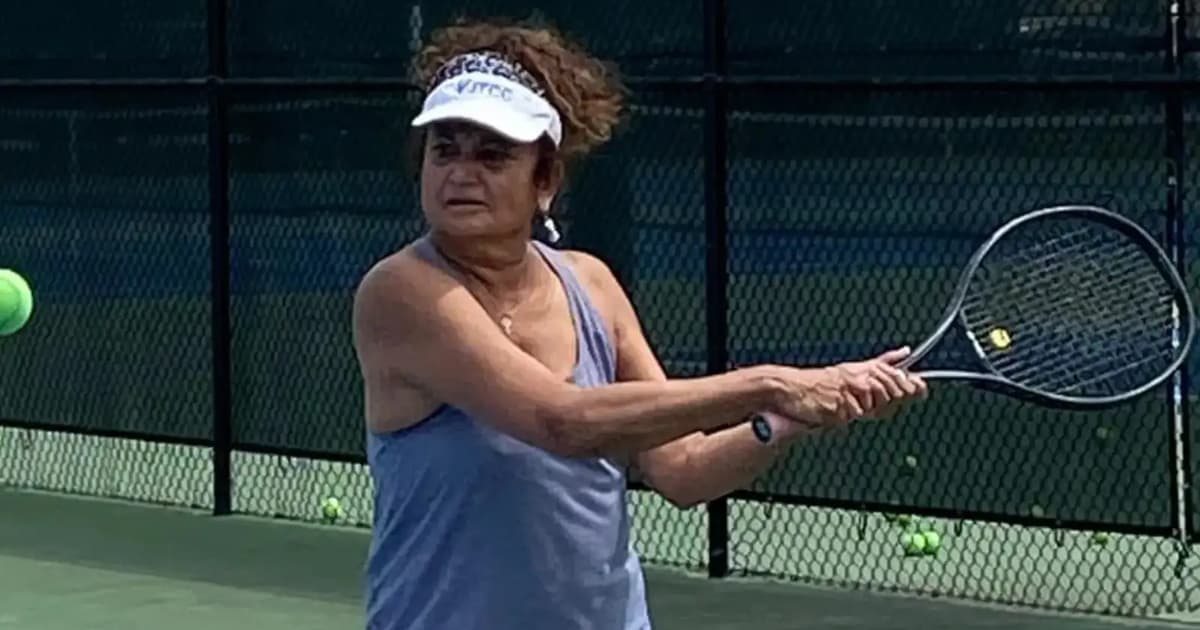
On a crumbling wall in Seremban, a physics teacher once chalked a line and told his daughter to serve at it.
That daughter, Radhika Menon, grew up to give Malaysia its only tennis gold.
Her father, Kavvikal Achutha Menon, was no professional coach.
He was a physics teacher in Rembau, a small town outside Seremban, who decided that tennis could be learned like equations — with diagrams, formulas and discipline.
He built contraptions, read American coaching manuals, and applied principles of momentum and velocity to a little girl with a racquet.
From those chalk lines came medals, pride, and a legacy Malaysia has forgotten.
In 1973, at the Southeast Asia Peninsular (SEAP, now SEA) Games, Radhika and partner Lim Kheow Suan struck gold in the women’s doubles.
It was Malaysia’s first, and still only, golden tennis triumph at the Games.
It felt, for a moment, as if her name had been etched in ink. Today, her medals linger in memory more like pencil strokes — visible, yet faint, waiting for the permanence they deserved.

A family project
Radhika, 70, calls it “the gift of parents.”
Her father and mother, Ambugem, were young Indian immigrants who arrived in Malaysia with education but little else.
Both taught science — he physics, she chemistry and biology — at Undang Rembau Secondary English School. They wanted their children to have more.
So their family home became a kind of laboratory for sport.
The father painted lines on a derelict wall to make a practice net. He tethered balls to strings so they wouldn’t roll away.
He devised agility ladders and core-strengthening drills long before sports science became fashionable.
Menon insisted on morning runs, on sweeping, and rolling the clay court before play, on discipline in both academics and sport.
“It was never about settling for mediocrity,” Radhika says. “He taught me resilience, structure, independence, perseverance. These were life lessons as much as tennis lessons.”
Her brother, Suresh, became her first sparring partner and went on to become a national champion and represent Malaysia in Davis Cup.
Her sister, Geeta, shared the same upbringing, watching how tennis consumed their father’s imagination.
It was, Radhika reflects, “a family project — none of this would have been possible without my parents’ devotion.”

An Indian girl with shorts
In the 1960s, tennis in Malaysia was still largely a club sport. Courts sat inside gated compounds, membership was costly, and the game carried an air of exclusivity.
Into that space walked a young Indian girl from a government school, wearing frilly tennis whites.
“Who in their right mind,” she laughs now, “would allow their Indian daughter to be traipsing all over the world in shorts and short frilly dresses?”
Yet she belonged. By 17, she was winning at the 1967 SEAP Games in Bangkok, bringing home a bronze medal. She repeated the feat in 1971 in Kuala Lumpur.
The message was clear: Malaysia had a genuine contender in women’s tennis.
She was also a runner, state champion in the 800m and 1,500m. But tennis had her heart — the rhythm, the contest, the individual battle that demanded courage point by point.

Breaking through
The peak arrived in 1973. Partnering Kheow Suan, she fought through the draw at the SEAP Games in Singapore and won Malaysia’s only tennis gold.
Fifty years later, no Malaysian man or woman has matched it.
The record stands as both a triumph and an indictment — a reminder of what was possible, and what was never built upon.
For Radhika, that medal is both joy and bittersweet proof. “We didn’t think of it as history then. We just wanted to fight for every point. Only later did I realise how rare it was.”
The one that slipped away
There was another moment that might have changed everything.
In the 1975 SEAP Games, contesting the singles final against the home hope, Suthasinee Sirikaya, she had match point.
She hit a shot down the line, convinced it was in. The umpire called it out.
The Malaysian team manager was nowhere in sight to protest. She lost the match. The gold slipped away.
Radhika calls it PTSD (Post-traumatic stress disorder). “Even now, it stings,” she says.
She remembers the noise of the Thai crowd, the injustice of the call, the loneliness of standing unprotected on that court.
“It was devastating,” she says. “To take pride in representing your country and not have support when you most needed it — that was my worst nightmare.”
There were other battles: rigged draws that favoured club players, prejudice in selection, the constant struggle to find sponsorship.
She kept going, but she never forgot.

Recognition, but faint
In 1970, at just 17, Radhika became sportswoman of the year, Malaysia’s highest sporting honour.
She stood on stage beside cyclist Ng Joo Ngan, the men’s winner, and felt what she calls “shock and awe.”
The honour, that followed her Negeri Sembilan sportswoman of the year award, was for her father as much as for herself.
“He was beaming with pride,” she says. “It was truly incredulous. What a tribute to him — my Nick Bollettieri.”
The award was supposed to come with RM5,000, but like other winners between 1966 and 1982, she never received it.
“The monetary award would have acknowledged the sacrifice,” she says. “A promise is a promise.”
That absence — of reward, of memory — is why her medals feel pencilled into the margins of Malaysian sport.

Life after Malaysia
When the applause faded, Radhika looked abroad. She studied in Australia, then settled in California, USA.
She married James McPartlan, a real estate developer who skis, plays ice hockey and dabbles in martial arts.
Together they raised two sons, Devon and Jaron, who both played collegiate tennis.
Her professional path carried forward her sporting discipline. She trained as a physical therapist, specialising in sports medicine and orthopaedics.
Today she works at the University of Colorado Sports Medicine and Performance Center, helping Olympians, footballers and basketball players recover and rebuild.
She also runs a private practice at a country club, treating golfers and tennis players.
And she still plays. Twice a week, usually with a local pro from Argentina. The rallies may be shorter, the footwork less sharp, but the joy, she says, is exactly the same.
Lessons that last
Looking back, she doesn’t dwell on medals. She talks about values.
“My father instilled discipline, resilience, confidence — qualities no medal can give you. That’s his gift to me. I live with gratitude every day.”
Her mother’s quiet support, too, shaped her. Holding the family together while her husband drilled the children, she gave them the sense that achievement was built on sacrifice.
Those lessons carried her through heartbreak, through prejudice, through years when her sport offered little financial security.
They remain with her as a mother, professional and traveller. “I’ve completed my world travel bucket list,” she says. “That’s something my father encouraged too.”
Ask most Malaysians about tennis today, and few will name Radhika. The sport never had its badminton-style boom.
Her victory sits largely forgotten, faint in the records.
Yet the achievement endures. Malaysia still has only one SEA Games tennis gold. It belongs to her and her doubles partner.
The medal remains. The record still stands. History may have written her lightly, but the story endures.
Game, set — still waiting for the ink.






